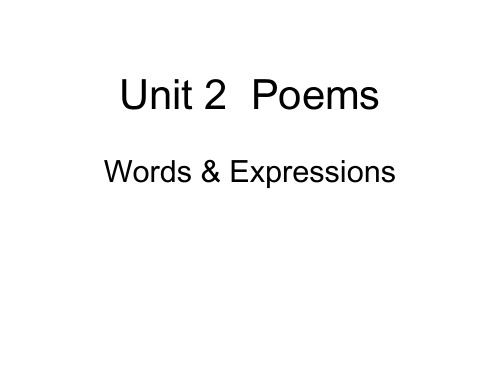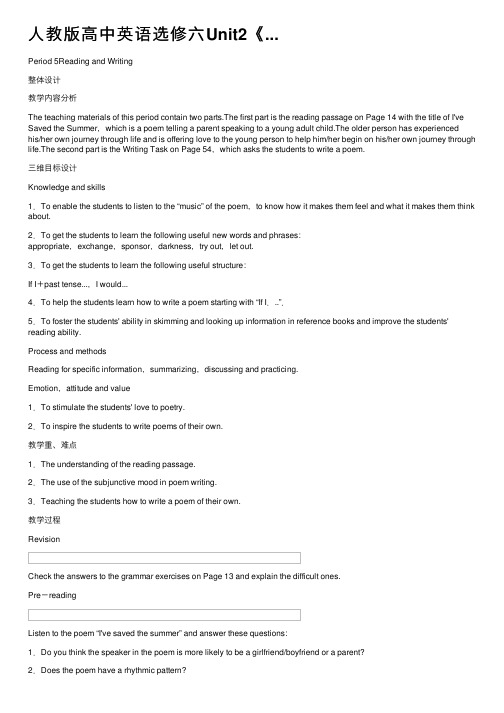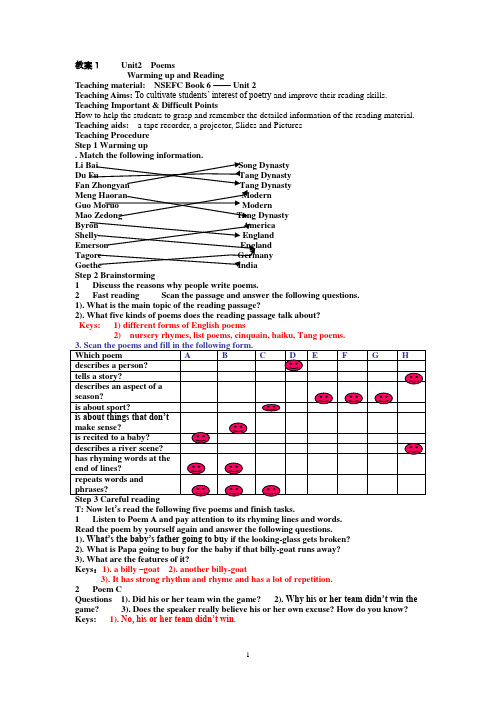2011年名师点津人教版英语选修6 Unit 2
人教版高中英语选修6 Unit2__Reading__精品教案

Unit2 Reading精品教案Teaching materialNSEFC Book 6 ——Unit 2Teaching AimsTo cultivate students’ interest of poetry and improve their reading skills.Teaching Important & Difficult PointsHow to help the students to grasp and remember the detailed information of the reading material.Teaching aids:a tape recorder, a projector, Slides and PicturesTeaching ProcedureStep 1 Warming up1. Which poems and poets can you think of when seeing the following pictures?静夜思李白床前明月光,疑是地上霜。
举头望明月,低头思故乡。
古风其二李绅锄禾日当午,汗滴和下土。
谁知盘中餐,粒粒皆辛苦。
望夫石王健望夫处,江悠悠。
化为石,不回头。
山头日日风复雨,行人归来石应语。
2. Match the following information.Li Bai Song DynastyDu Fu Tang DynastyFan Zhongyan Tang DynastyMeng Haoran Modern Guo Moruo Modern Mao ZedongTang Dynasty Byron America Shelly England Emerson England Tagore Germany Goethe India Step 2 BrainstormingDiscuss the reasons why people write poems. Fast readingScan the passage and answer the following questions. 1. What is the main topic of the reading passage?2. What five kinds of poems does the reading passage talk about? different forms of English poemsnursery rhymes, list poems, cinquain, haiku, Tang poems. 3. Scan the poems and fill in the following form.。
人教英语选修6 Unit 2 词汇完全讲解(共52张PPT)

emotion n. (c, u)情感;情绪;感情 Love,hatred and grief are emotions. She was shaking with emotion. →emotional adj. 令人激动的;易动感情的 →emotionally adv. →feeling n. (u) (pl)感情 read a poem with feeling hurt one’s feelings (u, 常sing)感觉,知觉 (c)看法 a feeling of security/guilt/relief have mixed feelings about…
easy常用表达:I am easy. 我随便。 That’s easy for you to say. 你说得倒容易。 Easy come, easy go. 来的容易,去得快。
①--I feel nervous before the exam. --____. C It won’t be too difficult for you to pass. ②--Just a moment. I haven’t finished packing my suitcase. D It’s high time we left for the airport. --___. ③--I’m sorry to keep you waiting. I’ll make short work of this. A --_____. I’m not in a hurry. A. Take your time . B. Take it easily C. Take things easy. D. Hurry up.
• be made up of… 由…组成/构成 →make up sth 形成,组成,构成 = be composed of… = consist of… made up of/consisting of • The medical team _____________________ five doctors and ten nurses will be sent to work in our village. • American Indians ______ about five percent of the US population. A. fill up B. bring up C. make up D. set up
人教版高中英语选修六Unit2《...

⼈教版⾼中英语选修六Unit2《...Period 5Reading and Writing整体设计教学内容分析The teaching materials of this period contain two parts.The first part is the reading passage on Page 14 with the title of I've Saved the Summer,which is a poem telling a parent speaking to a young adult child.The older person has experiencedhis/her own journey through life and is offering love to the young person to help him/her begin on his/her own journey through life.The second part is the Writing Task on Page 54,which asks the students to write a poem.三维⽬标设计Knowledge and skills1.To enable the students to listen to the “music” of the poem,to know how it makes them feel and what it makes them think about.2.To get the students to learn the following useful new words and phrases:appropriate,exchange,sponsor,darkness,try out,let out.3.To get the students to learn the following useful structure:If I+past tense...,I would...4.To help the students learn how to write a poem starting with “If I...”.5.To foster the students' ability in skimming and looking up information in reference books and improve the students' reading ability.Process and methodsReading for specific information,summarizing,discussing and practicing.Emotion,attitude and value1.To stimulate the students' love to poetry.2.To inspire the students to write poems of their own.教学重、难点1.The understanding of the reading passage.2.The use of the subjunctive mood in poem writing.3.Teaching the students how to write a poem of their own.教学过程RevisionCheck the answers to the grammar exercises on Page 13 and explain the difficult ones.Pre-readingListen to the poem “I've saved the summer” and answer these questions:1.Do you think the speaker in the poem is more likely to be a girlfriend/boyfriend or a parent?2.Does the poem have a rhythmic pattern?3.Does the poem have rhyming words?4.When you were listening to the poem,did it make you feel something or think about something? What did it make you feel or think about?Suggested answers:1.Students' answers may vary.2.Yes(it has two strong beats per line).3.Yes.4.Students' answers may vary.Reading1.Circle the words that rhyme.What is unusual about the rhyming words in the last four lines?2.Try beating or clapping the strong beats of the rhythm as you read the poem to yourself.Now listen to the poem again and clap the strong beats.Suggested answers:1.Circled words:you,new;need,feed;nineteen,mean;way,day;own,own.The rhyming words in the last four lines are unusual because they are the same word although they each have a different meaning.2.The strong beats of the rhythm are marked below:I've saved the sum merAnd I give it all to youTo hold on winter morn ingsWhen the snow is new.I've saved some sun lightIf you should ever needA place away from dark nessWhere your mind can feed.And for myself I've kept your smileWhen you were but nine teenTill you're older you'll not knowWhat brave young smiles can mean.I know no ans wersTo help you on your wayThe ans wers lie some whereAt the bott om of the day.But if you've a need for loveI'll give you all I ownIt might help you down the roadTill you've found your own.DiscussionIn small groups discuss these questions:1.Who is the speaker in the poem and who is he/she speaking to? Give reasons to support your answer.2.Which of the following is the closest to the speaker's message? Give a reason for your choice.A.If it's cold,I'll warm you;if it's dark,I'll give you light;if you're hungry,I'll feed you;if you want love,I'll give it to you.B.Although the future may be difficult for you,whenever you need warmth and love,remember I'll have some to give you. C.While you're away I'll remember your smile and I'll love you always.When you return,I hope you will love me. Suggested answers:1.A parent(mother or father)speaking to a young adult child(son or daughter).We know that the speaker is probably a parent because he/she is offering the child unconditional love(But if you've a need for love,I'll give you all I own).We know that the son/daughter is a young adult because the speaker refers to the time when you were but nineteen.2.BLanguage studyShow the students the following language points in a slide show.1.appropriate(P13)【原句再现】Match the beginning of each sentence with the appropriate ending.把每个句⼦的开头与其合适的结尾连在⼀起。
人教版高中英语选修六book6unit2

高中英语学习材料(灿若寒星*制作整理)Book 6 Unit 2I.Translate the following words and phrases:1. 传达某种感情16. 把…翻译成英语2. 童谣17. 从中选择3. 轻松;不紧张;从容18. 周而复始(week)4. 用完(run) 19. 玩文字游戏5. 由…构成20. 给读者强烈的印象6. 尤其;特别21. 一枚钻石戒指7. 把…转变成…22. 赢得冠军8. 为了换取…23. 获得奖学金9. 适合于24. 发出;放走;泄露25. 最后,终于10. 具体而富有想象力的语言11. 看起来自相矛盾26. 测试;试验12. 英诗的传统形式27. 一种灵活的模式13. 受某人的欢迎28. blank n. adj.14. 用最少的词语29. sponsor n. vt.15. 日文翻译(translation)30. 拿…取笑某人(tease)II. Key sentences in the text.1.Some poems tell a story or describe something in a way_________ will give the reader a strong ____________(impress).2.The language is concrete but ____________ (imagine), and they delight small children because they rhyme, have a strong rhythm and a lot of ____________ (repeat).3.List poems have a flexible line ____________ (long) and repeated phrases ____________ give both a pattern and a rhythm to the poem.4.The two haiku poems (F and G) above are ____________ (translate) from the Japanese.5. A lot of Tang poetry ____________ (translate) into English.6.With so many different forms of poetry ____________ (choose) from, students may ____________ (eventual) want to write poems of their own.7.Mr. Zhang explained the homework to the class yesterday. If Janice ____________ (pay) more attention at the time, she ____________ (not miss) her instructions.8.Bob doesn’t think he will ever win a poetry competition. If, by chance, he ____________ (win), he ____________ (spend) the prize money on a computer.IV. 阅读下面材料,在空白处填入适当的内容(不多于3个单词)或括号内单词的准确形式。
人教版高二英语选修6Unit2Poems全单元教案

教案1 Unit2 PoemsWarming up and ReadingTeaching material: NSEFC Book 6 —— Unit 2Teaching Aims: To cultivate students’ interest of poetry and improve their reading skills. Teaching Important & Difficult PointsHow to help the students to grasp and remember the detailed information of the reading material. Teaching aids: a tape recorder, a projector, Slides and PicturesTeaching ProcedureStep 1 Warming up. Match the following information.Li Bai Song DynastyDu Fu Tang DynastyFan Zhongyan Tang DynastyMeng Haoran ModernGuo Moruo ModernMao Zedong Tang DynastyByron AmericaShelly EnglandEmerson EnglandTagore GermanyGoethe IndiaStep 2 Brainstorming1 Discuss the reasons why people write poems.2 Fast reading Scan the passage and answer the following questions.1). What is the main topic of the reading passage?2). What five kinds of poems does the reading passage talk about?Keys: 1) different forms of English poems2) nursery rhymes, list poems, cinquain, haiku, Tang poems.T: Now let’s read the following five poems and finish tasks.1 Listen to Poem A and pay attention to its rhyming lines and words.Read the poem by yourself again and answer the following questions.1). What’s the baby’s father going to bu y if the looking-glass gets broken?2). What is Papa going to buy for the baby if that billy-goat runs away?3). What are the features of it?Keys:1). a billy –goat2). another billy-goat3). It has strong rhythm and rhyme and has a lot of repetition.2 Poem CQuestions1). Did his or her team win the game?2). Why his or her team didn’t win the game?3). Does the speaker really believe his or her own excuse? How do you know? Keys: 1). No, his or her team didn’t win.2). The players didn’t win because: Jack didn’t score that goal; they didn’t have enough time; they hadn’t trained hard….3). The speaker doesn’t really believe his or h er own excuses, because there has too many ifs…3 Poem D&E1). What subject is the speaker writing about?2). Does the speaker like the subject? Give a reason for your answer.4 T: We have enjoyed so many English poems. Some are traditional forms of English poetry but some are not, for example haiku. (It comes from Japanese).In fact English speaker also have borrowed from another kind of Asian poetry---Tang poems from China.Poem H at the bottom of this passage is a translation from the Chinese. Poem H 望夫石王健望夫处,江悠悠。
2011年名师点津人教版英语选修6 Unit 1

Julia learns a great deal of mathematics,
economics and her understanding of
economic issues.Very obviously,for her,
on the other hand,there are many factors
17.civilization n.
18.permanent adj.
_________________ 文明;文化
_________________ 永久的;持久的
19.conventional adj. _________________ 常规的;传统的
20.contemporary adj._________________ 当代的;同时代的
____________[同义] n.目标 goal
⑴ Don’t be ________,or you will feel life aimless
is boring. Living without an aim,you will
be going through life__________ and aimlessly meaninglessly.(aim)
6.____________ n.技术;方法 technique
7.____________ n. 目标;目的 v. 瞄准 aim
8.____________ v. 使确信;使信服 convince 9.____________ adj. 典型的 typust;strong belief faith 11.preference n. _________________ 喜爱;偏爱 12.aggressive adj.敢作敢为的;侵略的;好斗的 _________________
高中(人教版)英语选修6课件:unit 2 section 2
10.G
英语 选修6
Unit 2 Poems
课前 自主预习 课内 研析探究
Ⅱ.重点短语 make sense 1.__________________ 讲得通,有意义 express oneself 2.__________________ 表达自己的意思 nursery rhyme 3.__________________ 童谣 stay up 4.__________________ 熬夜
英语 选修6
Unit 2 Poems
课前 自主预习 课内 研析探究
2.句型展示:Some rhyme (like B) while others do not (like C).
有些押韵(如B),有些不押韵(如C)。
名师指津:while作并列连词,表示前后两者的对比,意为 “而,却”。
句 式 仿 写 : There’s plenty of rain in the southeast ,
someone,especially in a way that improves it
H.to laugh at someone and make jokes, either in a friendly way or in an unkind way
英语 选修6
Unit 2 Poems
课前 自主预习 课内 研析探究
Ⅰ.重点单词 1.branch A.a short poem or song,especially for children,using words that rhyme
2.flexible
3.eventually
B.definite and specific
C . a regularly repeated arrangement of shapes,colours,or lines on a surface,
人教版高中英语选修6 Unit2_Reading名师教学设计
教
学
目
标
语言目标:
能运用以下词汇、短语和句型进行听说读写四会:
Poetry aspect convey nursery diamond cottage balloon sparrow tease salty endless translate translation branch transform flexible anger sorrow take it easy run out of make up of
D.Russia E.China F.Germany
2. Teacher writes down an English version of Tang poetry on the whiteboard and ask students to guess whom the poet is and translate it into Chinese.
3.能理解不同国家所赋诗歌的文化差异。
策略目标:
1.学生能学会留心观察生活,在生活中寻找创作的灵感;
2.能运用精读策略体会诗人在诗中表达的内涵;
3.能通过击掌诵读和反复阅读诗歌了解诗歌的节奏和韵律。
教
学
重
难
点
教学重点:
1.通过诗歌朗诵和诗歌鉴赏,了解诗歌表达的内涵和意境;
2.引导学生区分并掌握不同国家诗歌的种类和形式。
人教版英语选修6unit2
青玉案. 元夕 --- 辛弃疾
Till, raising my cup, I asked the bright moon, To bring me my shadow and make us three.
举杯邀明月, 对影成三人。
Brainstorming
Trees
Green every spring Bright orange in autumn Bare in winter
(by Miki)
River Clear,wonderful Slapping,whirling,flowing
The river is cold.
Water
Our art teacher, Mr Shaw,
Try to find the words that rhyme: snow crow me mood heart
tree
rued part
Let’s talk about the types of the poem!
Poetry is a great form of literature. There are different kinds of rules for poems, so the forms of poems are quite different from country to country.
对一首诗,个人的感受会有不同。节奏流畅,语言精炼, 联想新颖的诗可算是好诗。堆砌词藻,一味抒发感情 而无实际内容的诗,只能是下乘的诗。
用心去听
二十世纪英美诗歌大量采用自由诗体,接近口语,可谓 大胆创新,大概也是诗歌发展的大势所趋吧。
用心去感受
诗以高度凝结的语言表达着人们的喜怒哀乐,用其特有 的节奏与方式影响着人们的精神世界。诗讲究联想, 运用象征、比喻、拟人等各种修辞手法,形成了独特 的语言艺术。
人教版选修6Unit2教案.doc
Unit 2 RobotsTeaching aims (教学目标)三维目标知识目标Knowledge aims:1 ・Master the important new words, phrases and sentence patterns・2.To learn about some simple forms of English poems.3・ To develop the students1 reading ability by skimming and scanning the passage.4.To develop the students1 speaking ability by talking about some features of some simple forms of English poems・5.Grammar in this unit:虚拟语气(Subjunctive Mood)能力目标Ability aims:1.To learn the main developing steps of the history of English poetry.2.To learn the characteristics of different forms of poems.3.To improve students1 reading ability.4.To practice writing simple poems.5.To guess what will be talked about in the listening materials.6.To improve their reading skills・7.Develop students9 reading ability and le t them learn different reading skills•情感目标1.To cultivate students1 appreciation of poetry and the ability of understanding, enjoying and writing poems・2.To develop students* sense of cooperative learning.3・ Activate the students' interest of learning English by using many kinds of classroom activities. Important points (教学重点)1.Get students to know about different types of poems, some poetic devices like rhythm, rhyme, repetition, sound patterns and imagery.2.Have students learn some useful new words and expressions about poetry and let them learn effective ways to master them.3.Enable students to grasp and use the expressions of intention and plans.4.Let students learn the new grammar item: the subjunctive mood(2).5- Develop students1 listening, speaking, reading and writing ability.Difficult points (教学难点)1 .Enable students to master the use of the subjunctive mood・2.Let students learn to create their own poems.3.Develop students1 integrative skillsTeaching methods (教学方法)1 ・ Task-based teaching and learning2.Cooperative learning and practice3.Asking-a nd-answeri ng activity to check the students9answers of the exercises;individual, pair orgroup work to finish each task.4.Fast and careful reading.5.Discussion.Teaching aids (教具)(1) a tape recorder(2) a projector(3)the blackboardwhiteboard and other normal teaching tools学法指导合作探究对话推理教材分析本单元的中心话题是诗歌。
- 1、下载文档前请自行甄别文档内容的完整性,平台不提供额外的编辑、内容补充、找答案等附加服务。
- 2、"仅部分预览"的文档,不可在线预览部分如存在完整性等问题,可反馈申请退款(可完整预览的文档不适用该条件!)。
- 3、如文档侵犯您的权益,请联系客服反馈,我们会尽快为您处理(人工客服工作时间:9:00-18:30)。
引起矛盾的; 引起矛盾的;好反驳的 16.contradictory adj.________________
17.flexible adj. 18.concrete adj. 19.forever adv. 20.transform v.
________________ 灵活的;可弯曲的; 灵活的;可弯曲的;柔顺的
1.轻松;不紧张;从容_______________ 1.轻松;不紧张;从容_______________ 轻松 take it easy 2.受到……的欢迎 受到…… 2.受到……的欢迎 _______________ be popular with 3.尤其,特别 3.尤其, 尤其 4.由……构成 4.由……构成 5.使……悲伤的是 5.使……悲伤的是 6.用完 6.用完 _______________ in particular _______________ be made up of _______________ to one’s sorrow _______________ run out of
3.The United Kingdom_____________ four is made up of countries,which are England,Scotland, , , , Wales and Northern Ireland. convey 4.The painter tried hard to_________ his to feelings______ viewers in a strange way, , which was not appreciated by everyone.
There are various reasons 1 ______ why people write poetry.Some poems tell 2 __ a story or describe something 3 ___ a way in that will give the reader a strong 4__________ (impress). impression
____________n.黑暗;漆黑 黑暗; 黑暗 darkness
⑴ It was dark in the room and we couldn’t see much at first,but after a few , minutes our eyes got used to the________ darkness (dark). ⑵ Thick clouds _________ (dark) the sky darkened before the rain fell.
1.____________ n.翻译;译文 翻译; 翻译 translation 2.____________ vt. 传达;传送 传达; convey 3.____________ v.交换;交流 交换; 交换 exchange 4.____________ n.悲伤;悲痛;懊悔 悲伤; 悲伤 悲痛; sorrow 5.____________ adj.含盐的;咸的 含盐的; 含盐的 salty
⑵ Love is an act of _________ (end) endless forgiveness,a tender look which , becomes a habit.
2.dark adj.黑暗的;昏暗的 黑ቤተ መጻሕፍቲ ባይዱ的; 黑暗的
darken ____________v.使变黑暗;变黑 使变黑暗; 使变黑暗
1.We’d better find a gas station before we get on the highway,in case we may , __________oil. run out of 2.It was a good concert,and I enjoyed the , last songs_____________ . in particular
5.At the sight of a snake on the road,Rose , immediately_________ a scream. let out 6.If we hadn’t ___________,we would not taken it easy , have won the game. 7._____________,he has lost all his To his sorrow , relations in the 5.12 Earthquake.
⑴ — How did the story end? — Just like most romantic stories,it , had a happy _________. The prince killed ending the monster and saved the princess in the ____ and they lived happily ever after. (end) end
with the words in nursery rhymes, , children learn about language.
1.It was urgent that he ____ (call) her call immediately. 2.It’s high time that something were done ________ (do) to prohibit selling fake commodities 3.I’d rather you _____ (leave) right away. left
5________ try to convey certain Others emotions. Poets use many different forms of poems to express themselves. In this text,however,we will look at , , a few of the simple forms.
4.appropriate adj.适当的 拨(款),挪用 适当的;vt.拨 款 , 适当的 ______________adv.适当地,相称地 适当地, 适当地 appropriately ______________adj.不适当的,不相称的 不适当的, 不适当的 inappropriate be appropriate to/for... 适合 适合…… appropriate... for(doing)sth.为……拨/占用 为 拨 占用 (款) 款
7.(把)转化成 把 转化成
_________________ transform ...into...
8.把……译成 _________________ 把 译成 translate ...into... 9.convey... to... _________________ ……表达 向……表达 10.day by day 11.try out 12.let out _________________ 一天天,逐渐 一天天, _________________ 试验, 试验,试用 _________________ 发出, 发出,放走
3.transform vi.& vt. 转化;转换;变换 转化;转换; Transformation 转化;转换; ________________n.转化;转换;改革 转化 transformative ________________adj. 可转化的 transform (change/turn)... into... 搭配 ___________________________ [搭配 搭配] 转换…… 把……转换 转换
inappropriate ⑴ Your skirt is _____________ (appropriate) for a formal party.It’s too short. ⑵ She picked up a dress appropriate_____ for/to the occasion.
⑶ Five million dollars has been appropriated ____ research into the for disease. ⑷ Try to dress ________________ appropriately (appropriate) for each occasion.
11.appropriate adj. 适当的;正当的 ______________ 适当的; 12.championship n.______________ 冠军称号 13.librarian n. 图书馆馆长;图书馆管理员 ______________ 图书馆馆长; 14.pianist n. 15.diploma n. ______________ 钢琴家; 钢琴家;钢琴演奏者 ______________ 毕业文凭, 毕业文凭,学位证书
具体的 ________________
________________ 永远 ________________ 转化;转换;改造; 转化;转换;改造;变换
1.end n.终结;末端;v.终结;终止 终结; 终结; 终结 末端; 终结 endless ___________adj. 无穷的;无止境的 无穷的; ___________n.电视、电影等的结局,结尾 电视、电影等的结局 结尾 ending 电视
Some of the first poetry 6________ written (write) in English was nursery rhymes.Children 7_________ (learn) learned these when they were very young. Nursery rhymes 8 ______ the one on like the right (A) are still a common type of children’s poetry.
